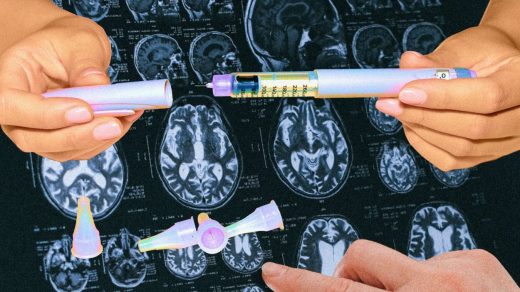Could weight-loss drugs like Ozempic cause depression—or help treat it?
Here’s a tale of two headlines: “Wegovy leads to weight loss. Can it treat depression, too?” Next up: “Wegovy, other weight-loss drugs scrutinized over reports of suicidal thoughts.”
So which one is it? Do these blockbuster medicines for diabetes and weight loss come with serious mental health risks, or could they actually be effective treatments for depression, bipolar disorder, Alzheimer’s disease, and other neurological conditions? It’s too early for a definitive answer, but ongoing research shows some early signs that these therapies, part of a drug class called GLP-1s, could be effective not just in trimming fat and protecting hearts. They might also help boost our brains.
Wegovy and Ozempic, both marketed by pharma giant Novo Nordisk, contain the same active ingredient (semaglutide). They come in different doses, might be administered through different means, and are approved by the Food and Drug Administration for different kinds of patients and diseases. These are treatments that were originally developed to treat type 2 diabetes, before mounting evidence demonstrated longer-term benefits like significant weight loss in obese patients and cutting the risk for heart attacks and cardiovascular-related deaths.
If you follow the biological breadcrumbs, these conditions are intertwined (for instance, patients who are obese often also have diabetes and a significantly increased risk for high blood pressure, heart attacks, and stroke). These are metabolic disorders—afflictions rooted in how your body channels and produces energy from the food you eat. It’s no shock that such a basic function of the human body, the literal means of creating and properly using energy, has consequences for everything from your heart to your brain. And therein lies the clue to why drugs like Wegovy might have treatment implications for neurological conditions on top of more seemingly obvious connections between other maladies (for instance, that an inability to process glucose as an overweight diabetes patient might impact that patient’s heart health).
Earlier reports that GLP-1s like Wegovy might come with a risk for depression and suicidal thoughts were based on reports and anecdotes from a small subset of patients—265 total patients who had taken these kinds of treatments since 2010, as of October 2023 to be exact, according adverse event reports collected by the FDA. That data collection is important for patient safety. But given the scope of both cardiovascular and neurological conditions like heart disease, diabetes, stroke, and Alzheimer’s—conditions that are all in the top 10 causes of death in the U.S. and kill more than 1 million Americans per year—those unfortunate events are extraordinarily rare based on the data to date.
A far larger study of 1 million health records, backed by the National Institutes of Health and published in the journal Nature Medicine in January, comes to a very different—in fact, the direct opposite—conclusion on GLP-1 class drugs like semglutide’s potential effect on mental health and depression. “Our analyses do not support concerns of increased risk of suicidal ideation with semaglutide and instead show a lower risk association of semaglutide with both incident and recurrent suicidal ideation compared to non-GLP1R agonist anti-obesity and anti-diabetes medications,” wrote the study authors.
It’s important to note that these studies aren’t clinical trials; they’re based on available real-world evidence and health data. “Novo Nordisk is . . . studying semaglutide across a variety of disease states, including metabolic dysfunction-associated steatohepatitis (MASH) and Alzheimer’s disease. However, Novo Nordisk is not currently running any clinical trials focusing on semaglutide and depression,” the drugmaker told Fast Company in an emailed statement.
But just as the trail from how GLP-1s like Wegovy and Ozempic battle diabetes has led to demonstrated effects on weight loss and heart attack risk, initial research suggests they might have neurological benefits over the long-term, too, including in alleviating depression, because of complex body-wide connections related to how we metabolize food and energize our cells.
“People with depression and/or anxiety commonly experience a symptom profile that influences appetite, energy, and motivation. As a result, presentation of major depressive disorder is often consistent with a phenotype that increases vulnerability toward weight gain,” wrote researchers from the University of Calgary in a 2021 study.
There are still plenty of biological unknowns surrounding how metabolism affects certain types of brain function, and theories abound on why GLP-1s specifically might prove to be effective mental health treatments. The ultimate proof will depend on larger-scale randomized clinical trials. But the early signs and preliminary research suggest the story of the potential for GLP-1s to transform public health is just beginning.
(12)



